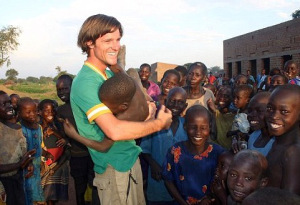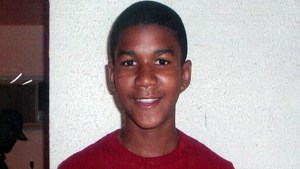 White Evangelical Christians love African children.
White Evangelical Christians love African children.
Two years at Grace College (a predominantly white Grace Brethren college in small town Indiana) taught me that. Students went on missions trips in which it was mandatory to return with at least one picture of you surrounded by African children, or perhaps holding an African baby.
Then, of course, there was Invisible Children. Middle class white guys “giving voices” to black children in Uganda. Grace College was all over that. And I include myself when I speak of Grace College–I went on mission trips and I was heavily involved with Invisible Children for about a year.
Yes, Grace College loved children in Africa.
But then Black History Month came around and the conversation about black children changed.
Where we blindly trusted a couple of white guys telling us that African children in Uganda were being oppressed, we refused to believe the African-American woman speaking in chapel telling us that our black neighbors’ children were being oppressed as well.
Where we sacrificed our minimum wage paychecks to send food to children in Africa, we ranted about affirmative action and welfare in America, calling it “reverse racism” or laziness.
Where we saw children in Africa as totally helpless, we saw African American children as the cause of their own oppression.
I don’t accuse every Grace College student of participating in this, nor do I suggest that the college actively promoted these mindsets. But these are the conversations I overheard in the cafeteria. These are the arguments I saw on Facebook. These are the things we discussed in our dorm rooms late at night.
And we Grace College students were not alone. In fact, we were products of our society.
Our society loves children in Africa. We see them as helpless victims in need of our saving.
But black children in America? They’ve brought their problems upon themselves.
This double standard becomes glaringly obvious when we realize that Joseph Kony is famous, but Trayvon Martin is not.
We see Ugandan culture as savage and backward and in need of redemption.
 Yet, we live in a culture where a white/hispanic man can stalk a 17 year old black kid who is walking home from the store. We live in a culture where a white man can shoot and kill that 17 year old black kid just because that black kid looked suspicious and was carrying a bag of Skittles. We live in a culture where the police let this white man walk free because he killed, out of “self-defense,” an unarmed black teen who dared commit the offense of walking down the street.
Yet, we live in a culture where a white/hispanic man can stalk a 17 year old black kid who is walking home from the store. We live in a culture where a white man can shoot and kill that 17 year old black kid just because that black kid looked suspicious and was carrying a bag of Skittles. We live in a culture where the police let this white man walk free because he killed, out of “self-defense,” an unarmed black teen who dared commit the offense of walking down the street.
We don’t even try to fix these problems in our own culture.
In fact, we rarely even acknowledge them.
Yet we are confused when the rest of the world does not welcome our efforts to “rescue” them.
I by no means wish to belittle the efforts of those who have been on short-term mission trips or those involved in Invisible Children. But both forms of activism raise all sorts of complications that we need to wrestle with (Jamie the Very Worst Missionary and Dan Haseltine draw attention to many of them). One being that our culture portrays children in Africa as victims, helpless to fix their own situation and in need of rescue, while portraying black children in America as potential criminals, always up to no good and worthy of being shot and killed for no good reason.
Something is terribly wrong here.
If you would like to sign a petition asking for Trayvon Martin’s murderer to be brought to justice, please do so here.











